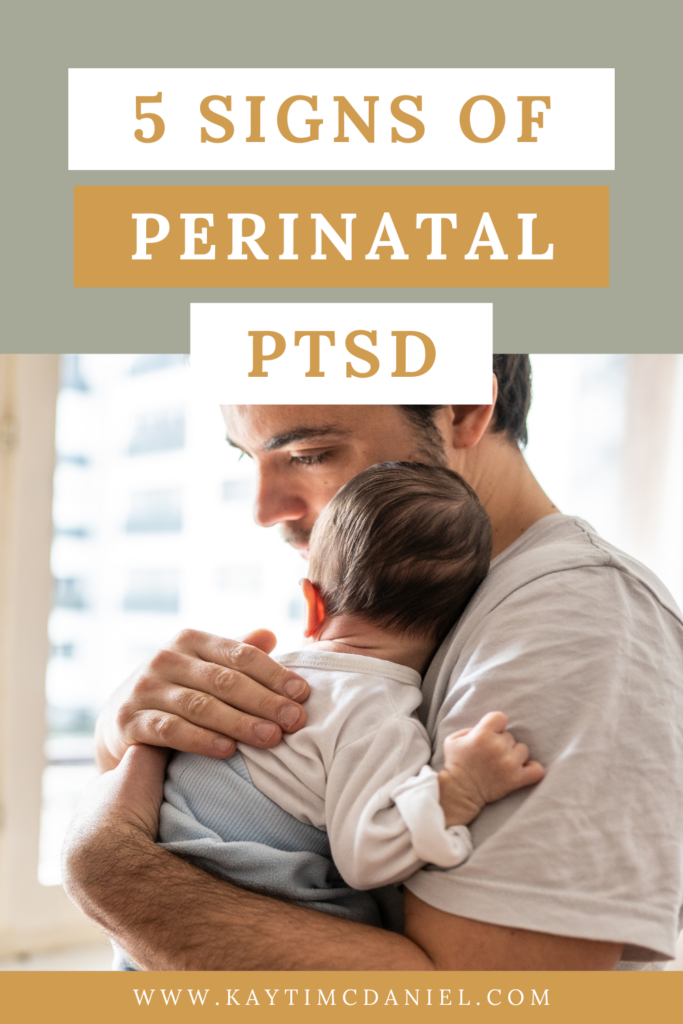
What is perinatal PTSD?
Perinatal PTSD (posttraumatic stress disorder) is one of several perinatal mood and anxiety disorders that can show up during pregnancy and/or the postpartum year. Perinatal PTSD includes prenatal PTSD during pregnancy and postpartum PTSD after birth.
Here are 5 signs of perinatal PTSD:
1. You’ve experienced trauma.
Some experiences during pregnancy, birth, or the postpartum year may put you at higher risk of developing perinatal PTSD (such as serious medical complications for you, your partner, or your baby). But the truth is, “trauma” can be less about the facts of an experience and more about your perception of it. Any event (or series of events) that made you feel physically or emotionally unsafe, afraid, helpless, out of control, or overwhelmed has the potential to: 1) be considered traumatic and 2) be a risk factor for perinatal PTSD.
2. You’re re-experiencing your trauma.
Intense and disturbing memories, nightmares, and flashbacks can make it feel like you’re living through the traumatic experience all over again. This can keep you feeling mentally, emotionally, or physically “stuck” in the trauma. Even if part of you knows the trauma is over, there is another (LOUD) part of you that worries it’s not.
3. You’re avoiding things because of the trauma.
When you experience a trauma, your brain scans your environment to try to understand and remember cues for future danger. It’s basically trying to sense: “how can I prevent or respond to this in the future in order to stay safe?”
All of the details of everything you sensed during a traumatic experience have the potential to become triggers (or red flags) to your nervous system that you might be in danger — even if you’re not. Sensing these triggers as you’re going about your day can be uncomfortable at best and absolutely terrifying at worst. It’s possible (and understandable!) that you may want to avoid them. This avoidance may start to feel like a problem when it gets in the way of the life you want.
4. Your trauma has changed the way you think and feel.
A traumatic experience can have a negative impact on how you view yourself. For example, you may be overwhelmed with intense emotions and convinced that you’ll never feel like yourself again. Or, you may blame yourself for the trauma, even if part of you knows it wasn’t your fault.
A trauma can also influence what you think and feel about others. It can make it really hard to trust people. It can be challenging to connect with others who might not understand what you’re going through. You may even start to feel disconnected from your closest friends and family.
A trauma can shape your perspective about the world in general. Your experience may lead you to believe that the world is completely unsafe, unpredictable, and chaotic. With this belief, even normal daily activities can feel really scary.
5. You’re especially on edge.
When so much of your mental bandwidth goes towards scanning for danger, your bandwidth for everything else plummets. You’ll notice a shift in how well you’re able to manage your emotions, attention, and energy throughout the day. You may be feeling more irritable, angry, or tense than usual. You might start to experience issues with falling or staying asleep. Your best efforts at coping might be putting you in dangerous or unhealthy situations. All of this can make it really hard to feel safe, calm, and present in your day to day life.
Do you relate to any of these signs of perinatal PTSD?
If so, here’s some good news: perinatal PTSD (like other perinatal mood and anxiety disorders) is treatable and can be temporary. Click here to get started with therapy or check out this post to browse additional options for perinatal mental health support online and near you.